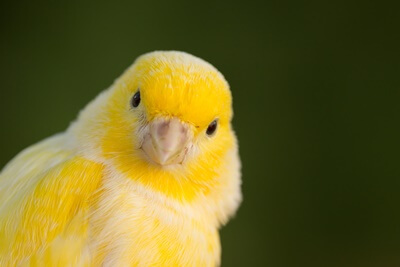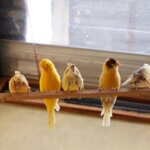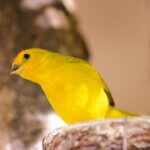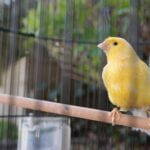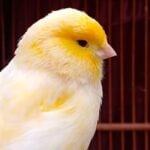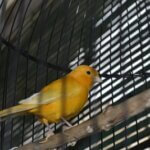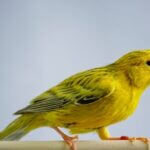Canaries are known for their beautiful songs and chirping. So, it can confuse owners when their canaries make a strange clicking sound.
This clicking noise may be a form of entertainment or signify a respiratory issue, air sac mites, or nutritional deficiency.
You’ll know the difference based on other symptoms, such as lethargy, difficulty breathing, and changes in its throat’s shape.
If none are present, your canary may be having fun.
Why Is My Canary Making Clicking Noises?
In certain situations, clicking is just a harmless pastime for a canary; in other cases, it’s a sign of illness.
Here are the reasons that your canary is clicking and how you should respond:
Canary Clicking Beak Or Tongue
Some clicking sounds are voluntary and harmless. Like other birds, canaries are prone to making random sounds to entertain themselves.
While they can’t mimic household noises, like a ringtone or a door unlocking, they can tap their beaks together or click their tongues.
This is a way for a canary to stay busy. It’ll enjoy the sound and use it to pass the time.
Of course, a canary is more likely to “peep” or chirp as entertainment since it’s in the finch family, and this noise comes easier to it.
All canaries have their preferences and personalities, so your bird may like clicking its beak together or making a small “ticking” sound with its tongue.
This is more likely when the canary has gotten your attention in the past with that sound.
If it wants food, a chance to sing with you, or merely your presence, it could replicate any sound that got your attention before.
If you investigate the odd clicking sound out of concern or intrigue, the canary will repeatedly replicate it.
This is a normal and harmless sound as long as your canary doesn’t manifest any signs of illness. Smooth feathers, a clear voice, a willingness to be active, and a healthy appetite mean your canary is having fun.
Air Sac Mites
That said, there are times when a clicking sound means the presence of air sac mites. These parasites are a common plague upon birds, despite being easy to treat.
According to Istanbul University, canaries differ from other songbirds because the lower ends of their tracheae form a thin membrane called the tympanum.
The tympanum produces the vibrations that make up their iconic songs. Therefore, they must be clear for the sound to come out smoothly.
The trachea of canaries doesn’t have a uniform width and narrows near the syrinx and the tympanum.
This creates a turbulent airflow, which means some infectious diseases or parasites, like air sac mites, land here rather than in the upper trachea.
This positioning can make your bird “click” instead of vocalizing normally when it tries.
Most canaries don’t show any symptoms in the early stages of mite infection, which means that the infection in its trachea is serious when your bird produces clicking sounds.
According to the Journal of Avian Medicine and Surgery, some mites cause sudden death at this stage.
Fortunately, all mites are manageable with timely medications like ivermectin and enrofloxacin. They’re also preventable by regular cleaning and disinfection of cages.
The key is to reach out to your vet as soon as you notice warning signs. These include:
- Breathing with mouth open
- Wet nostrils
- Sneezing and coughing
- Wheezing
- Fluffed-up feathers
- Stopped singing completely
- Lethargy
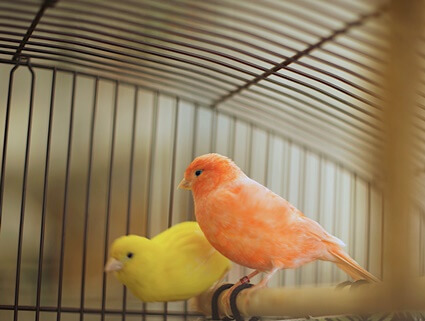
Respiratory Infections
Beyond air sac mites, canaries are vulnerable to bacterial infections in their respiratory system.
This may happen due to exposure to a dirty cage or another infected animal, but it can also happen when the canary accidentally swallows something too sharp or large. If its throat gets wounded, it can be especially vulnerable to an infection, even if it otherwise heals.
Lesions generated in the syrinx aren’t only painful for the affected canary but can give the bird a “dry” throat. As a result, the canary will constantly produce guttural sounds to clear its throat, which may come out as clicking and wheezing sounds.
Likewise, any chemical disturbance in the air can throw a canary into respiratory distress. A clicking sound is a common symptom of this. Look out for:
- Cigarette smoke
- Aerosol sprays
- Smoke
- Dust
- Scented candles
Aside from the clicking sounds, a bird going through respiratory distress will be panting, coughing, and sneezing and may also have nasal discharge. Depending on how strong the bird is affected, it may also bob its tail and appear unsettled.
Although respiratory distress is easily treated, it’s wise to visit the vet. Canaries don’t often recover from respiratory issues without medical intervention.
Nutrient Deficiencies
If you don’t feed your canary the right mix of nutrients, it’ll have deficiencies, some of which can be life-threatening. A prime case is iodine deficiency.
This mineral is used by the thyroid gland, located in the lower throat. The gland uses iodine as the main ingredient in the production of hormones required to regulate the following:
- Reproductive system
- Metabolism
- Digestion
- Heart rate
- Growth
Consequently, a lack of iodine can lead to the thyroid gland expanding significantly, in a condition known as goiter. Since canaries don’t have large necks, goiter is easily identifiable.
It’ll block the canary’s airways, causing breathing difficulties, which means the canary will:
- Take hard, labored breaths
- Constantly make clicking and wheezing sounds
- Have difficulties eating
- Vomit regularly
Swift intervention, usually in the form of iodine injections, will be necessary to save your canary’s life.
To be on the safe side, make a point of buying high-quality pellets for your bird, as they contain higher amounts of iodine than regular seed diets.
You may also use multi-vitamin supplements designed specifically for birds.

